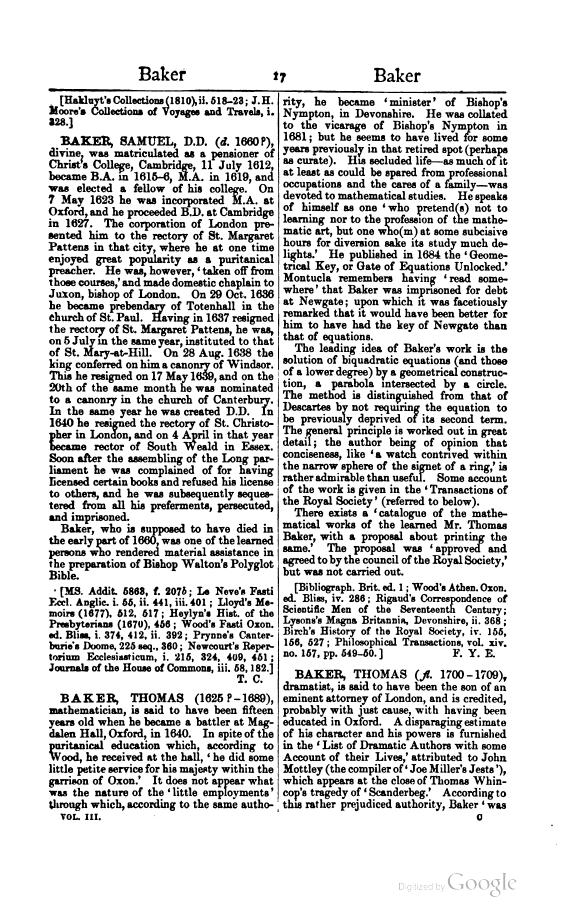[Hakluyt's Collections (1810),ii. 518-23; J. H. Moore's Collections of Voyages and Travels, i. 328]
BAKER, SAMUEL, D.D. (d. 1660?), divine, was matriculated as a pensioner of Christ's College, Cambridge, 11 July 1612, became B.A. in 1615-6, M.A. in 1619, and was elected a fellow of his college. On 7 May 1623 he was incorporated M.A. at Oxford, and he proceeded B.D. at Cambridge in 1627. The corporation of London presented him to the rectory of St. Margaret Pattens in that city, where he at one time enjoyed great popularity as a puritanical preacher. He was, however,'taken off from those courses,' and made domestic chaplain to Juxon, bishop of London. On 29 Oct. 1636 he became prebendary of Totenhall in the church of St. Paul. Having in 1637 resigned the rectory of St. Margaret Pattens, he was, on 5 July in the same year, instituted to that of St. Mary-at-Hill. On 28 Aug. 1638 the king conferred on him a canonry of Windsor. This he resigned on 17 May 1639, and on the 20th of the same month he was nominated to a canonry in the church of Canterbury. In the same year he was created D.D. In 1640 he resigned the rectory of St. Christopher in London, and on 4 April in that year became rector of South Weald in Essex. Soon after the assembling of the Long parliament he was complained of for having licensed certain books and refused his license to others, and he was subsequently sequestered from all his preferments, persecuted, and imprisoned.
Baker, who is supposed to have died in the early part of 1660, was one of the learned persons who rendered material assistance in the preparation of Bishop Walton's Polyglot Bible.
[MS. Addit. 5863, f. 2076; Le Neve's Fasti Eccl. Anglic. i. 55, ii. 441, iii. 401; Lloyd's Memoirs (1677), 512, 517; Heylyn's Hist. of the Presbyterians (1670), 456; Wood's Fasti Oxon. ed. Bliss, i. 374, 412, ii. 392; Prynne's Canterburie's Doome, 225 seq., 360; Newcourt's Repertorium Ecclesiasticum, i. 215, 324, 409, 451; Journals of the House of Commons, iii. 58,182.]
BAKER, THOMAS (1625?–1689), mathematician, is said to have been fifteen years old when he became a battler at Magdalen Hall, Oxford, in 1640. In spite of the puritanical education which, according to Wood, he received at the hall, 'he did some little petite service for his majesty within the garrison of Oxon.' It does not appear what was the nature of the 'little employments' through which, according to the same authority, he became 'minister' of Bishop's Nympton, in Devonshire, He was collated to the vicarage of Bishop's Nympton in 1681; but he seems to have lived for some years previously in that retired spot (perhaps as curate). His secluded life—as much of it at least as could be spared from professional occupations and the cares of a family—-was devoted to mathematical studies. He speaks of himself as one 'who pretend(s) not to learning nor to the profession of the mathematic art, but one who(m) at some subcisive hours for diversion sake its study much delights.' He published in 1684 the 'Geometrical Key, or Gate of Equations Unlocked.' Montucla remembers having 'read somewhere' that Baker was imprisoned for debt at Newgate; upon which it was facetiously remarked that it would have been better for him to have had the key of Newgate than that of equations.
The leading idea of Baker's work is the solution of biquadratic equations (and those of a lower degree) by a geometrical construction, a parabola intersected by a circle. The method is distinguished from that of Descartes by not requiring the equation to be previously deprived of its second term. The general principle is worked out in great detail; the author being of opinion that conciseness, like 'a watch contrived within the narrow sphere of the signet of a ring,' is rather admirable than useful. Some account of the work is given in the 'Transactions of the Royal Society' (referred to below).
There exists a 'catalogue of the mathematical works of the learned Mr. Thomas Baker, with a proposal about printing the same.' The proposal was 'approved and agreed to by the council of the Royal Society,' but was not carried out.
[Bibliograph. Brit. ed. 1; Wood's Athen. Oxon. ed. Bliss, iv, 286; Rigaud's Correspondence of Scientific Men of the Seventeenth Century; Lysons's Magna Britannia, Devonshire, ii. 368; Birch's History of the Royal Society, iv. 155, 156, 527; Philosophical Transactions, vol. xiv. no. 157, pp. 549-50.]
BAKER, THOMAS (fl. 1700–1709), dramatist, is said to have been the son of an eminent attorney of London, and is credited, probably with just cause, with having been educated in Oxford. A disparaging estimate of his character and his powers is furnished in the 'List of Dramatic Authors with some Account of their Lives,' attributed to John Mottley (the compiler of 'Joe Miller's Jests'), which appears at the close of Thomas Whincop's tragedy of 'Scanderbeg.' According to this rather prejudiced authority, Baker 'was
